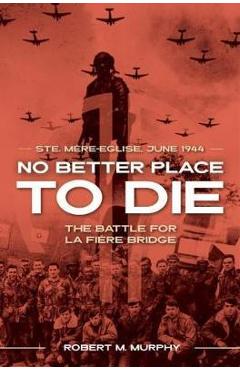No Better Place to Die: Ste-Mere Eglise, June 1944--The Battle for La Fiere Bridge - Robert M. Murphy

Detalii No Better Place to Die:
libris.ro
85.62 Lei
95.13 Lei
History
Robert M. Murphy
No Better Place to Die: - Disponibil la libris.ro
Pe YEO găsești No Better Place to Die: de la Robert M. Murphy, în categoria History.
Indiferent de nevoile tale, No Better Place to Die: Ste-Mere Eglise, June 1944--The Battle for La Fiere Bridge - Robert M. Murphy din categoria History îți poate aduce un echilibru perfect între calitate și preț, cu avantaje practice și moderne.
Preț: 85.62 Lei
Caracteristicile produsului No Better Place to Die:
Comandă No Better Place to Die: Online, Simplu și Rapid
Prin intermediul platformei YEO, poți comanda No Better Place to Die: de la libris.ro rapid și în siguranță. Bucură-te de o experiență de cumpărături online optimizată și descoperă cele mai bune oferte actualizate constant.
Descriere magazin:
The you-are-there story of one of the most ferocious small-unit combats in US history As part of the massive Allied invasion of Normandy, three airborne divisions were dropped behind enemy lines to sow confusion in the German rear and prevent panzer reinforcements from reaching the beaches. In the dark early hours of D-Day, this confusion was achieved well enough, as nearly every airborne unit missed its drop zone, creating a kaleidoscope of small-unit combat. Fortunately for the Allies, the 505th Regimental Combat Team of the 82nd Airborne Division hit on or near its drop zone. Its task was to seize the vital crossroads of Ste Mère Eglise, and to hold the bridge over the Merderet River at nearby La Fière. Benefiting from dynamic battlefield leadership, the paratroopers reached the bridge, only to be met by wave after wave of German tanks and infantry desperate to force the crossing. Reinforced by glider troops, who suffered terribly in their landings from the now-alert Germans, the 505th not only held the vital bridge for three days but launched a counterattack in the teeth of enemy fire to secure their objective once and for all, albeit at gruesome cost. In No Better Place to Die , Robert M. Murphy provides an objective narrative of countless acts of heroism, almost breathtaking in its you are there” detail. No World War II veteran is better known in 82nd Airborne circles than Robert M. (Bob) Murphy. A Pathfinder and member of A Company, 505th PIR, Bob was wounded three times in action, and made all four combat jumps with his regiment, fighting in Sicily, Normandy, and Holland. He was decorated for valor for his role at La Fière, and is a Chevalier of the French Legion of Honor. After the war, he was instrumental in establishing the 505th RCT Association. Table of Contents Foreword. By Colonel Mark J. Alexander Introduction. By Ian Daglish Part No Better Place to Die.” By Bob Murphy Chapter 1: Soldiers Tell the Tale Chapter 2: A Change of Plan Chapter 3: Operation A Pathfinder\'s View Chapter 4: The Battle at La Fiè The Mission of the 1st Battalion, 505 Parachute Infantry Regiment Chapter 5: Across the Causeway Chapter 6: The Battle of Chef-du-Pont Chapter 7: D-Day Plus June 7, 1944 Chapter 8: Advance across the Marsh Chapter 9: Last Enemy Attack and the End of the Normandy Campaign Part Eyewitness Paratrooper Accounts Landing Alone on D-Day. By Howard Huebner The Hottest Single Incident”: The 1st Battalion, 505 Parachute Infantry Regiment at La Fière. By Mark J. Alexander The Tank Attack on La Fière Causeway; June 6, 1944. By Marcus Heim Letter to General Gavin. By John Dolan Chief” Turner The Action at Neuville-au-Plain. By Bob Murphy D-Day in Ste. Mère-Eglise. By Spencer F. Wurst Part Eyewitness Gliderist Accounts A Brief History on Gliders. By Bob Murphy D-Day Glider Landing. By Clinton Riddle Landing with the Tank Force at Utah Beach. By Lucius P. Young The 325 Glider Infantry Regiment Attack across La Fière Causeway. By Lee Travelstead A Medic in Normandy. By Chester Walker The Fighting at Cauquigny and Le Motey. By Wayne Pierce Part Eyewitness French and German Accounts The Panzer Ersatz und Ausbildungs Abteilung 100 The Battle of La Fière, Seen from the Manoir. By Madame Louis Leroux Manning the Bell Tower at Ste. Mè A German Perspective. By Rudolph May The Light of June 6, 1944. By Alexandre Renaud, Wartime Mayor of Ste. Mère-Eglise Part Return to Normandy Epilogue. By Bob Murphy Acknowledgments Appendix Citations Robert M. Bronze Star Medal with Bronze V Device Marcus Distinguished Service Cross Charles Medal of Honor Appendix Historical Notes and Documents 82d Airborne Division The Activation of the 505 Parachute Infantry Regiment Jump Training The Parachutist\'s Creed Notes on the 505 Pathfinders Pathfinder Employment for Operation Neptune Appendix Stories for the Next Generation In Memory of Bill Owens. By Bob Murphy The Rabbit\'s Tale. Or, How a Big French Jackrabbit Helped Win the War. By D. Zane Schlemmer Christmas in the Bulge, 1944. By D. Zane Schlemmer Living History, Keeping History

Produse asemănătoare

No Better Place to Die: Ste-Mere Eglise, June 1944--The Battle for La Fiere Bridge - Robert M. Murphy
![]() libris.ro
libris.ro
Actualizat in 28/10/2025
85.62 Lei

No Better Place to Die: Ste-Mere Eglise, June 1944--The Battle for La Fiere Bridge, Paperback/Robert M. Murphy
![]() elefant.ro
elefant.ro
Actualizat in 26/10/2025
100.99 Lei
Produse marca Robert M. Murphy

No Better Place to Die: Ste-Mere Eglise, June 1944--The Battle for La Fiere Bridge - Robert M. Murphy
![]() libris.ro
libris.ro
Actualizat in 28/10/2025
85.62 Lei